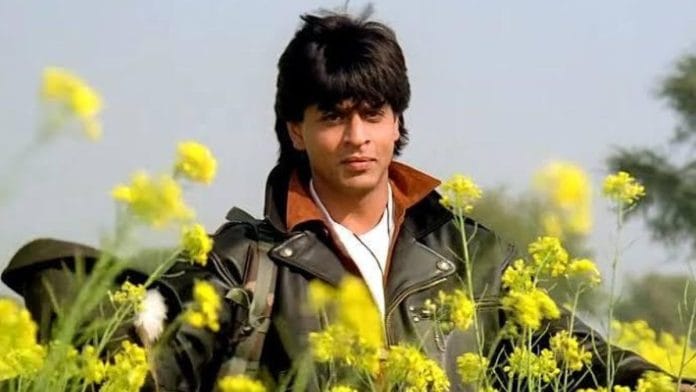New Delhi: Dilwale Dulhania Le Jayenge is 30 years old. Two generations have come of age in these three decades. India has changed. And so has Shah Rukh Khan’s advice to young women in India. It has travelled from stoic sacrifice to ease, from family values to individual comfort, from choosing the hard, bumpy path to finding joy here and now.
When Lajwanti (Farida Jalal) told Raj (Shah Rukh Khan) to elope with Simran (Kajol), knowing her husband would never approve of their relationship, Raj stood firm. He promised to win over her family the right way, no matter how difficult.
His dialogue: “Mushkil rasta hi chuno, kyunki asaan raaste par toh bheed chalti hai (Pick the difficult path, because the easier one is crowded)”, rightly captured the spirit of the 1990s. It glorified the belief that the harder path often leads to more meaningful rewards. It was an India that was still steeped in the old values of Generation X and boomers.
Fast forward to Dear Zindagi (2016) and SRK, playing a therapist, advises Alia Bhatt’s character to choose the easier path if it brings peace. He was seen challenging the old-style glorification of hardship. He himself transitions from being a swooning romantic hero to a wise life coach.
“Kabhi kabhi hum mushkil rasta sirf is liye chunte hai… kyunki humein lagta hai, important cheezein paane ke liye humein mushkil rasta apnana chahiye…apne aap ko punish karna bahut zaroori samajhte hai … but why, aasaan rasta kyun nahi chun sakte … kya burai hai us mein (Sometimes we choose the difficult path just because we think that to get something important, we must struggle. We feel it’s necessary to punish ourselves. But why?),” said SRK’s Dr Jehangir.
“In the mid-1990s, at the time of DDLJ, SRK was the face of India’s post-liberalisation aspirations. By the time of Dear Zindagi, this had evolved to a focus on self-care and authenticity as understood by Gen Z,” Shoma Munshi, Professor of Social & Behavioral Sciences at the American University of Kuwait, told ThePrint.
This is how Shah Rukh Khan’s two seminal pieces of advice to women bookend the story of a changing India and its generational transition.
For millennials, who grew up with the values of hustle, perseverance, and emotional strength, SRK’s ‘mushkil rasta’ advice made perfect sense. Not for Gen Z, who value mental health, setting boundaries, and choosing kindness toward themselves, and a chill vibe over constant struggle.
Through these two different phases of his career, SRK became the voice of his generation, first reflecting the ideals of endurance, then embodying the wisdom of balance. Together, these roles show how each generation approaches life on its own terms, shaped by the world in which they have grown up.
Cultural touchstone
DDLJ emphasises balancing love with familial duty, tradition, and cultural values. Hence, Raj’s pursuit of Simran while respecting parental approval resonated with both urban and rural audiences.
“Millennials were teenagers or young adults in the mid-90s when DDLJ released,” Shoma explained. Gen X was in their mid-20s then.
“These generations (Gen X and Boomers), especially in India, were navigating a post-liberalisation era with exposure to global culture but still tethered to traditional family expectations.”
For many, DDLJ felt personal, reflecting their own efforts to balance individual desires with traditional expectations. Its lasting appeal, as significant in the film’s unprecedented run of over 1,000 weeks at Mumbai’s Maratha Mandir, is a testament to the film’s cultural impact and emotional relevance across generations
Anecdotally, according to Shoma, Millennials often cite DDLJ as a cultural touchstone, with Raj’s charm and the ‘live for love’ ethos shaping their romantic ideals. At the same time, they choose not to distance themselves from their families, regardless of whether their families are right or wrong.
Also read: Meet Malayalam actor Kalyani Priyadarshan who beat Mohanlal at Kerala box office
The Gen Z therapist
Dear Zindagi focused on mental health, self-discovery, and breaking free from societal pressures. It taught a whole generation to prioritise itself above everything. It even compared choosing a romantic partner to picking a comfortable chair. By then, SRK had thrown the trope of life-is-an-endurance-test out of the window. He says that it’s good to set boundaries; sometimes “being bad” (not always pleasing others) is okay.
The evolution in his advice mirrors social change: from love stories as fairy tales to love stories as real‑life journeys where mental health, self‑awareness, and respect matter just as much as romance.
The film’s emphasis on therapy struck a powerful chord with urban Gen Z audiences, who are growing up in a world shaped by constant digital exposure, shifting family structures, and increasing pressure to succeed.
Social media often creates unrealistic standards for success, beauty, and happiness, while economic instability and competitive job markets add layers of stress and uncertainty about the future.
On top of that, changing relationships with parents and family expectations can make emotional well-being even harder to navigate. Add to this the turbulence of romantic relationships.
(Edited by Ratan Priya)






